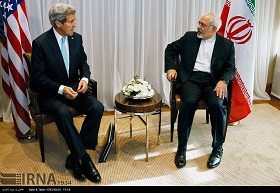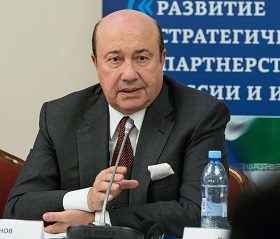The latest round of talks between Iran and six world powers of international mediators was held in Geneva on February 22, 2015. The only real outcome of the forum held in Switzerland was an agreement to hold another meeting on March 2 (although the U.S. Department of State described the talks as very productive).
The latest round of talks between Iran and six world powers of international mediators was held in Geneva on February 22, 2015. The path towards regular contacts on the Iran nuclear problem was cleared on November 24, 2013 when Teheran and representatives of the world community signed the “nuclear pact” (under the document, Iran would suspend uranium enrichment over 5 per cent, destroy nuclear materials enriched up to 20 per cent within six months, stop the construction of new nuclear centres and curtail its plutonium programme in exchange for the right to enrich uranium up to 5 per cent and an easing of international economic sanctions). However, after 18 months the prospect of concluding a comprehensive agreement is still remote. This time around too, the only real outcome of the forum held in Switzerland was an agreement to hold another meeting on March 2 (although the U.S. Department of State described the talks as very productive).
At the present time, the two sides face a range of unresolved problems that stymie the negotiating process. Teheran and the six powers are unable to agree, firstly, on the conversion of the reactor in Arak; secondly, on the facility in Fordo, which has several thousand uranium enrichment centrifuges (some members of the six powers insist on dismantling the enterprise); and thirdly, on the time that the final agreement is to be signed.
Both Iran and the six powers (especially the United States) periodically issue sharp statements which significantly aggravate the information and business climate around the negotiating process (during the Geneva meeting in February, for example, Iranian Deputy Foreign Minister A.Araqchi declared that the Iranian delegation would walk out of the talks if it feels pressure on the part of its “Western partners” ; US President Barack Obama for his part periodically questions the need to continue dealing with Teheran over “nuclear disarmament” issues).
Iran is a very difficult and inconvenient negotiator. This has long been known. On the nuclear issue, Teheran’s intransigence increases many times over because the Islamic Republic’s authorities directly link this problem with national sovereignty. Making concessions on the nuclear dossier is for Iran an extremely complicated and painful, but necessary step (because of the plight of its economy). This step should be taken with extreme caution so as not to provoke mass protests by the population, whose living standards have dropped significantly in recent years owing to the international embargo.
Therefore, the Iranian government must, first of all, present its case to the world in such a way as not to make the population see a retreat on the nuclear issue as capitulation. Secondly, it must negotiate as many economic and political preferences as possible for Iran in order to stabilize its economy within the shortest space of time (the priority issue for Teheran is to attract foreign investments into the gas industry).
These are the two circumstances that account for Iran’s intransigence in talks with international mediators. Teheran bargains furiously because the stakes in its game with the six powers are extremely high. At stake are the stability of the country, the future of its economy and the whole system of “Islamic democracy” (for the sake of fairness, it has to be said that of all the Muslim countries only Iran has managed to put its own unique system of government in place, in which elements of theocracy are intertwined with and sometimes sidelined by liberal methods).
In recent years, Iran’s hopes for a relatively favourable outcome to talks with the six powers have increased because the West, and the United States in particular, want to see Teheran join the struggle against ISIL (the media have recently reported that President Obama and Iran’s spiritual leader Ali Khamenei have started a correspondence on the issue) . In recent years, Iran has linked its participation in the anti-terrorist coalition with the problem of promoting negotiations on the nuclear issue.
Will the parties reach a consensus and sign a comprehensive agreement before the summer of 2015? Considering the peculiarities of Iranian diplomacy, this is unlikely. As long as Iran has wiggle room (talks on Teheran’s participation in the U.S.-led antiterrorist coalition) it will continue bargaining with the world community. However, the prospects of a new deal are not entirely hopeless (even if a final result is not reached by the summer of 2015).
Most probably Iran will eventually cave in to the six powers. This conclusion is prompted by the precarious state of the country’s economy, which is in dire need of foreign investments (there are no opportunities in sight for getting the national economy up and running without foreign investments). Western companies are interested in breaking into the Iranian market (signals to the effect were issued to Iran as early as 2013 by representatives of Chevron, ExxonMobil, Conoco, Anadarko and a number of European energy giants).
There are already some signs of de-escalation. Thus, before the start of February negotiations in Geneva Iran suspended the operation of its powerful IR-5 gas centrifuge (a fact confirmed by the IAEA and the U.S. Department of State). Almost simultaneously the American company Boeing stepped up its cooperation with Iran Air by handing over to Iran seven air engines repaired at American enterprises.
Summing up, one can say that the chances of a new deal being signed between Iran and the West in the median term are rather good. The settlement of the “nuclear issue” would lead to an early lifting of the international embargo and trigger the flow of foreign investment to Iran. Such a development, which is equally welcome both for Iran and for the West, presents Russia with the challenge, that is, the possibility of losing some of its positions in the world hydrocarbon market once it is joined by Iran as a fully fledged participant (Iran is obviously a potential rival of Russia in this market).
In this connection, Russia must not be slow in taking measures to be the first among the countries lining up to invest in Iran’s gas industry. Iran is concerned above all about its own national interests and if a Russian proposal turns out to be more attractive than those of Europe and the United States, it will work with the Russian corporations.
The sanctions on Iran will inevitably be lifted, but not any time soon. Therefore, Russia still has a chance to adjust its strategy in the global energy market with due account of the Iran factor. Failing that, yet another important source of currency revenue will be lost.
Delay on this issue would be disastrous.






